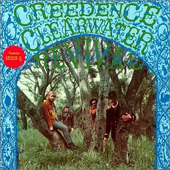
I set myself up. I carefully handcrafted a bear trap, and I stepped right into it. I boldly declared that I was going to write an overview of the entirety of Creedence Clearwater Revival's output. It's a huge undertaking, and I decided to make it the inaugural post on this blog. Seven albums plus a live album. I decided the best way to go about this would be to write about at least an album a day. So as to not over do it.
First, maybe a small bit of background on how I feel about Creedence. When I first got my record player, my first mission was to get all of Creedence's LPs. It was (is) a search that has taken some time. It's a lot harder to find a good copy of Bayou Country or Willy And The Poor Boys than it is to find the omnipresent Cosmo's Factory. Nearly impossible to get your hands on
Mardi Gras, their big flop, the nadir of the career. When Fogerty let go of his iron fist on the rest of the band, they floundered and broke up. Fogerty is almost like James Brown, Brown, a famous dictator, kept his band in check. Even when he was surrounded by some of the greatest musicians alive, it was his way or the highway. Fogerty folded, though, and made a terrible album.
At their peak, Creedence was like an American Beatles. Hit after hit after hit. No White Album ever came out of Creedence, but that'd be expecting too much. Creedence has been regarded as a singles band for a long time, yet every album is incredibly solid, if not for at least one instance of filler on each album (except for Cosmo's Factory which is nearly perfect). Maybe Creedence was more of an American Rolling Stones. Just without the lechery.
One thing you'll notice throughout Creedence's records is they have an affinity for older r&b songs. If these songs didn't contain enough menace, Fogerty was there to make sure they were dark, dark, dark. Their first, self titled album starts with the evil stompings of Screamin' Jay Hawkins' "I Put A Spell On You". As with most songs on this record, Creedence stretches it out, revealing themselves to be one of the most proficient jam bands of the era. Their "jams" were more one note droning, akin to Neil Young and Crazy Horse on Everybody Knows This Is Nowhere. Nothing is particularly long on Revival, reaching only as far as 4:41, so much as masterfully arranged. The songs drop away from themselves at just the right time for the band to come in and work out and give some swampy foreboding.
Two songs on this record point towards what will happen over the course of the next couple records, the earnest "Porterville" points towards the blue-collar anthems that would make Creedence their hay. While "Walk On The Water", one of the few Fogerty-penned songs here (along with "Porterville"), it sounds horrifying. It points towards the longer numbers and the light experimentation and tinkering with formula that would color each successive Creedence album. Backwards tape noises slipping into nervous spots, one insanely over driven guitar counterbalanced by a clean guitar, in a rhythm showdown, snaking together till they duel it out in solos that sound like they were recorded with the intention of being played backwards. Backwards tape noise interjects little demon hisses and moans as the solos die out, one last burst of rhythm, and the song and the album fades away. This song is semi-famously covered by Richard Hell on Blank Generation, which was the version I was acclimated to until I finally heard this album a few years back. Creedence doesn't get enough credit for being forebears of punk rock. Their raw sound, adherence to early rock standards, populist rhetoric, hating hippies, all very punk rock.

No comments:
Post a Comment